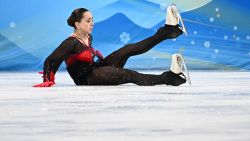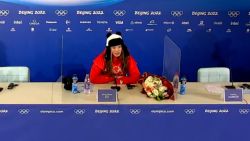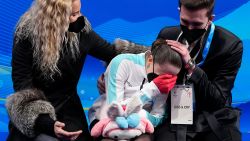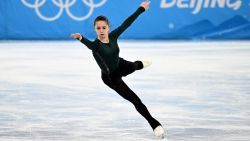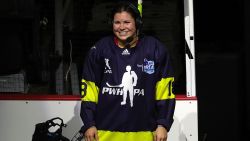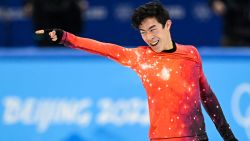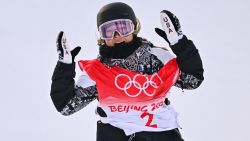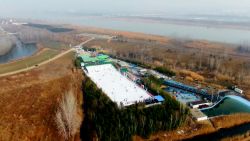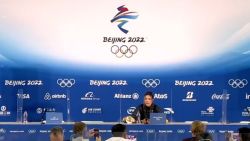As Kamila Valieva fell multiple times in Thursday’s free skate program at the Beijing 2022 Winter Olympics, many of the figure skating fans in attendance felt for the 15-year-old.
Under the immense weight of a huge doping scandal, Valieva finished in fourth place in the women’s individual event, while her Russian Olympic Committee (ROC) teammate Anna Shcherbakova captured gold.
Valieva – who was the clear favorite to finish in first place after coming out on top of Tuesday’s short program – broke into tears as she left the ice as the emotion of the past few days appeared to catch up with her.
Loud chants of “Kamila, Kamila, Kamila” came from the stands as a tearful Valieva was consoled by coach Eteri Tutberidze as she made her way off the rink.
Former US Olympic figure skater Polina Edmunds offered her support to Valieva on Twitter.
“Very traumatizing Olympic experience for Kamila Valieva. She should not have been allowed to compete, it’s devastating that she was put in this situation, on all levels.”
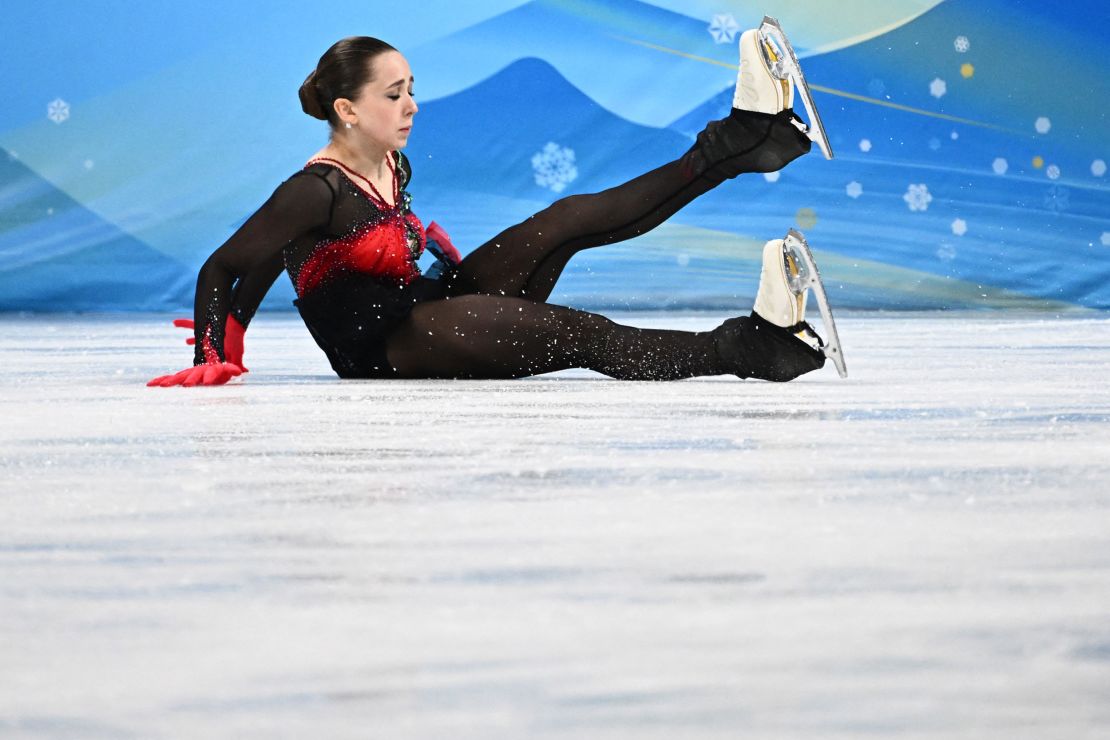
Shcherbakova, who was the skater who competed directly before Valieva in the final, said she felt “nervous” watching her teammate skate.
“I watched Kamila but probably did not understand what I was experiencing,” the 17-year-old said. “Of course, I was very nervous for her during the skate because from the very first jump it was clear that the skate is going very hard and I understand perfectly what an athlete feels at those moments.”
Why was Valieva even allowed to compete?
But the controversy over Valieva being allowed to compete in the event despite the doping storm that hangs over the Russian skater’s head was the main talking point as she struggled to maintain her run and penned the next chapter in a story that is certain to rumble on far beyond the Beijing Games.
The Russian figure skater has been at the heart of a doping scandal that can be traced back to December 2021, when the 15-year-old tested positive for the banned heart drug trimetazidine, which experts say can enhance endurance.
Valieva has sought to blame the positive test on contamination from medication taken by her grandfather, an IOC official familiar with the Court of Arbitration for Sport (CAS) hearing which cleared Valieva for the rest of the Games said on Tuesday.
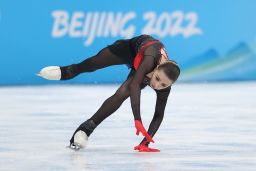
However, the test was only analyzed and reported to Russia’s Anti-Doping Agency (RUSADA) in February, resulting in Valieva’s suspension on February 8.
The suspension came a day after Valieva had helped the ROC to a gold medal victory in the figure skating team event.
Valieva was reinstated after an appeal, and the Court of Arbitration for Sport (CAS) allowed her to compete in the Olympics. CAS said in a statement it had decided Valieva should be allowed to compete due to “exceptional circumstances,” including specific provisions linked to her status as a “protected person” – because she is a minor – under the World Anti-Doping Code.
The clause allows “specific provisions for different standards of evidence and for lower sanctions.”
CAS also noted Valieva did not test positive during the Winter Olympics. In making the decision, the panel considered “fundamental principles of fairness, proportionality, irreparable harm,” the statement said.
It concluded “that preventing the athlete from competing at the Olympic Games would cause her irreparable harm in these circumstances.”
Questions of fairness
The skater’s continued involvement in the Games led US sprinter Sha’Carri Richardson to question the decision – citing a positive test for cannabis that derailed her own Olympic dream in Tokyo last summer.
“Can we get a solid answer on the difference of (Valieva’s) situation and mines (sic)?” Richardson wrote on Twitter.
“My mother died and I can’t run and was also favored to place top 3. The only difference I see is I’m a Black young lady,” she added.
International Olympic Committee (IOC) spokesman Mark Adams said on Wednesday that the cases didn’t have “a great deal of similarity.”
“Obviously every single case is every different, and this one hasn’t even reached the end of the case yet. But in terms of Ms. Richardson’s case, she’s tested positive on the 19th of June, quite a way ahead of the Games,” Adams told reporters.
“The results came early order for USADA to deal with the case on time, before the Games. Ms. Richardson accepted one month period of ineligibility, which began on June the 28th. So I would suggest that there isn’t a great deal of similarity between the two cases.”
On Tuesday, an IOC official said that Valieva was blaming the doping violation – in which she tested positive for a heart medication that experts say can improve stamina – on contamination from her grandfather’s medication.
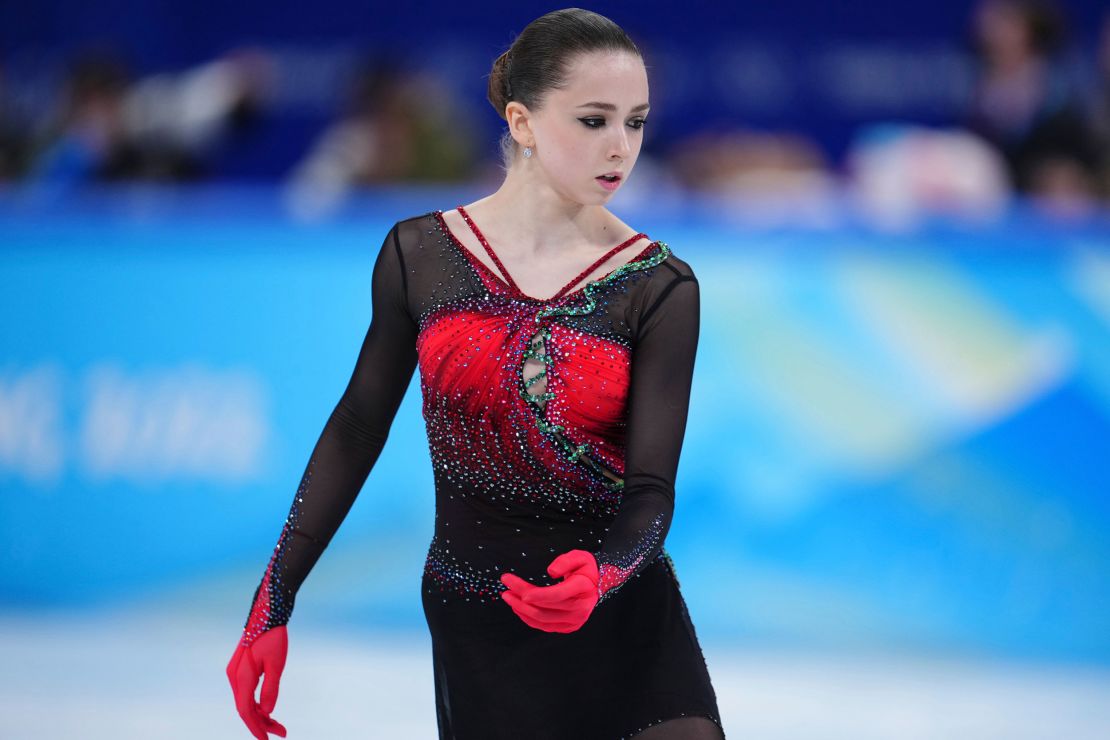
Her coach Tutberidze told Russian state news agency Tass they are “absolutely sure” she is innocent. The World Anti-Doping Agency (WADA) and RUSADA, though, are investigating Valieva’s entourage.
The medication’s effects of increased endurance could potentially prove influential following a rule change in 2004 which rewards athletes for performing jumps towards the end of their routines.
Under the current scoring system, jumps performed in the second half of the free skate can get a 10% bonus because it’s more difficult to perform them on tired legs.
Following widespread criticism of the rule in 2018 – with critics alleging that skaters were cramming in jumps towards the back end of performances – the International Skating Union created a new rule saying skaters will only get 10% bonuses for up to three jumping passes in the second half of their free skate.
It was under this context and unprecedented pressure that Valieva competed in the individual event, yet the 15-year-old posted the highest score in the short program on Tuesday to arrive at Thursday’s deciding free skate in pole position.
Further controversy followed when it was announced by IOC spokesman Adams that any result involving Valieva in the women’s individual event would carry an “asterisk” until her case has been concluded, and as such, there would be no flower or medal ceremony.
Yet after multiple falls in her free skate routine, Valieva’s fourth placed finish left her just outside the podium places.
Subsequently the medal ceremony is set to go ahead on Friday, February 18, according to the official Olympics media website.
The head of the US Anti-Doping Agency (USADA) Travis Tygart said about Valieva in a statement: “On the one hand, my heart breaks for her because of the despicable acts of the adults in her life and the catastrophic failures of the Russian and IOC-run systems that permanently cast a dark cloud over her performances.
“On the other hand, all of us who value clean sport are sick to our stomachs because these failures have tragically robbed clean athletes of their incredible sacrifice and Olympic dreams.”
What does the future hold for Russia at the Olympics?
Russian athletes are currently unable to compete under their country’s name, flag and national anthem at major international sporting events until December 16, 2022.
WADA, though, warned ahead of the Beijing Games that although Russia was now following anti-doping rules it shouldn’t assume sanctions will automatically lifted when the country’s suspension ends. Russia seems to think differently.
Kremlin spokesperson Dmitry Peskov told reporters earlier this week that Russia would be able to compete at the next Olympics as “a normal full-fledged national participation regime.”
“We hope that from the next Olympic cycle we will enter a normal full-fledged national participation regime. Russia has always been a very responsible member of the Olympic family and remains fully committed to the ideas of Olympism,” Peskov said.
Although WADA won’t comment further while Valieva’s doping case remains ongoing, serious questions will be asked about the country’s full re-integration into the Olympic and anti-doping fold.
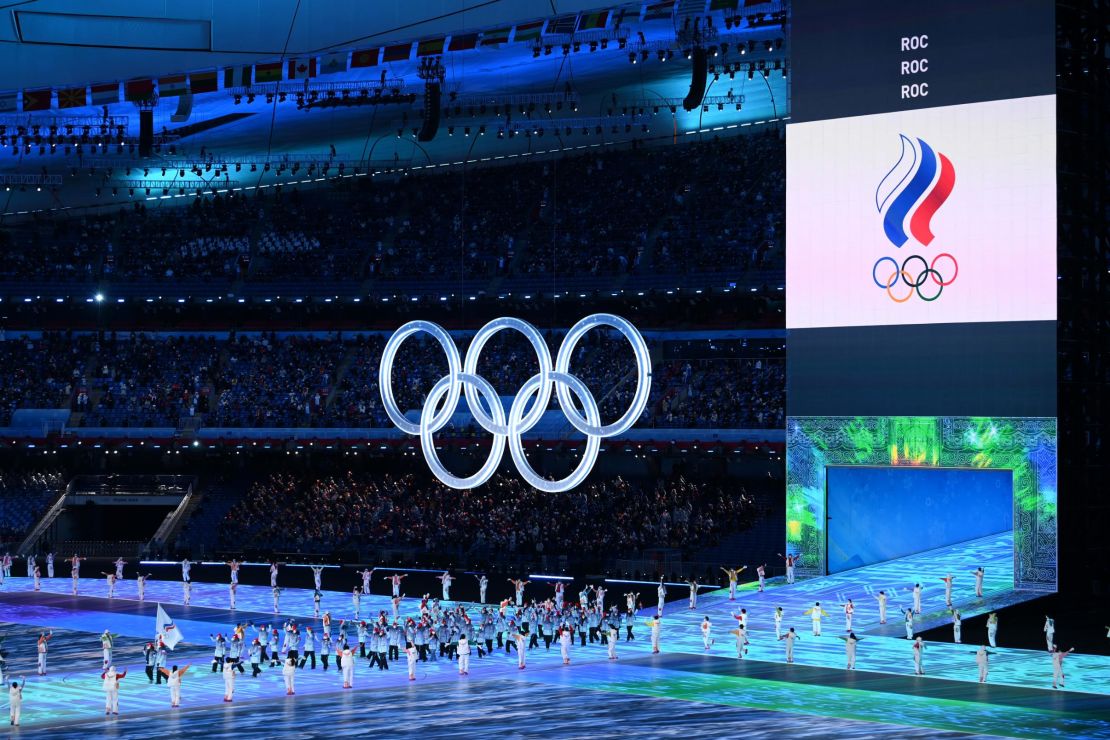
It could be “time for a time out for Russia in the Olympics” the founding president of the WADA, Dick Pound, told CNN, responding to the CAS decision to allow figure skater Valieva to continue competing.
“This is going on too long, and it’s too obvious. Maybe, it’s time for a time out for Russia in the Olympics,” Pound said during an interview with CNN’s Selina Wang.
“You know, the [Russian] government cannot explain why nobody will play with them. And the answer is it’s because you cheat,” he continued.
Pound, who is also a former vice-president of the IOC, told CNN that the punishments the ROC has faced since Sochi have been “lenient” and ineffective, and that while banning the team from competition might be “the nuclear option” it would get Russia’s “attention.”
“That’s the nuclear option. You simply say sorry, you will not be invited to the next Games, you will not be able to host any Olympic sport events and so forth, that will get their attention. So far, we’ve been relatively unsuccessful in getting their attention because every decision that’s rendered gets appealed,” Pound said.
“That’s not a healthy atmosphere for Russia. And it’s not a healthy atmosphere in which the athletes from the rest of the world have to compete in competitions where there are Russians,” he added.
CNN’s Aleks Klosok contributed to this report.



